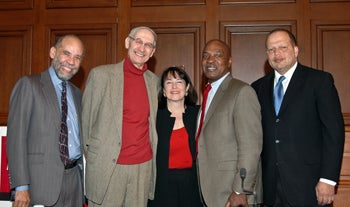Panelists at a February 23 event on the Harvard Law School campus discussed the benefits and consequences of pursuing “color-blind” policies, despite the pervasive racial disparities that continue to characterize American society. Moderated by HLS Professor Charles Ogletree ’78, the panel discussion was part of the annual Harvard Black Law Students Association Spring Conference and was co-sponsored by the Charles Hamilton Houston Institute for Race and Justice.
“I want families that look like America,” said HLS Professor Charles Fried. “When the government does not allow you to be whoever you want to be, then everything stops… and progress cannot be made. That is what I mean by a colorblind society: a society where the government…does not categorize people, put them into boxes, or say, ‘this is who you are, this is who you must be.’”
Judge Nancy Gertner of the U.S. District Court for the District of Massachusetts disagreed with Fried, saying that not talking about racism will not solve race-relations problems. American society is still deeply racialized, and the government cannot pretend otherwise, she said.
“The government puts its fingers on the scales in so many ways, and while we may not be able to call it overt discrimination, it seems to me one has to account for it,” she said.
Gertner focused on how the government can stop racism in schools by teaching children a concept of “racial literacy,” where students “talk about what the world is like and how to deal with a world which is multi-racial.” Students need to learn about what it means to have different skin colors and how to interact with people who are different than they are, she said.
John Payton ’77, a partner at WilmerHale, and Theodore M. Shaw, director-counsel and president of the NAACP legal defense and education fund, both spoke in agreement with Gertner.
